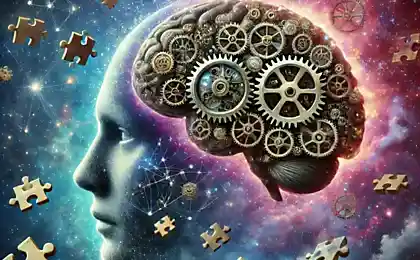172
6 Signs of Weak Thinking and How Not to Let It Hinder Your Growth
Your mind is a tool for transformation

Imagine that your mind is a camera lens. When it is clean and rightly tuned, the world appears before you in all its glory, full of possibilities and prospects. But once the lens becomes foggy or unfocused, reality becomes blurred, distorted, devoid of clear contours. And so does our thinking.
Weak thinking is neither a sentence nor a birth defect. These are just a set of mental habits that can be changed if you know how to approach them. Each sign of weak thinking is not a reason for self-flagellation, but a signal to action, an invitation to growth and development.
87%
People periodically encounter patterns of weak thinking, according to research by cognitive psychologists.
Sign #1: You’re constantly questioning yourself.
The familiar situation is that you complete a project, create something really valuable, get praise from your colleagues, and immediately that inner critic comes into your head. This voice isn't just an opinion, it's like a professional demotivator who gets paid to convince you of his own worthlessness.
Attention: The mechanism of sabotage
Constant self-doubt works as an inner saboteur. They do not protect against mistakes, but paralyze the ability to act and grow.
This inner critic feeds on our childhood fears and insecurity, turning into a tyrant in adulthood. He takes your achievements and passes them through the depreciation filter: “Oh, it’s elementary,” “Just lucky,” “Anyone would have coped.”
The next time you hear an inner critic, imagine someone else saying those words. If your friend was constantly devaluing your accomplishments in this way, would you spend a lot of time with him? Start treating inner criticism as an obsessive acquaintance whose opinions can be politely ignored.

Sign #2: You avoid change, even minor ones.
Change is frightening not only by scale, but also by its very essence. Our brains are evolutionarily programmed to perceive the unknown as a potential threat. In ancient times it helped to survive, but in the modern world it has become a brake on personal development.
The Comfort Zone Paradox
The longer you stay in your comfort zone, the smaller it gets. Avoiding change gradually narrows your options and makes you more vulnerable to inevitable changes in the future.
Avoiding change starts with small things. You order the same food in a restaurant, go to work on the same route, buy clothes of the usual colors and styles. What's wrong with that? The problem is that the brain gets used to this stagnation and begins to resist even the necessary changes.
Start with tiny changes: try a new dish once a week, change the route home, listen to music of another genre. These micro-experiments will gradually retrain your brain to perceive the new not as a threat, but as a source of interesting experiences.
Sign #3: You blame others for your failures
Shifting responsibility is a defense mechanism that seems like salvation, but actually takes control of your life. When everyone is to blame—a fool boss, a lazy colleague, a government thief—you automatically become a victim of circumstance.
Accepting responsibility is not self-flagellation, but the return of power over your life.
Studies show that people with an external locus of control (those who believe their lives are affected by external factors) are more likely to suffer from depression, anxiety, and lower career achievements. It’s not that the world is unfair to them, it’s that they’re not using their ability to influence the situation.
50/50 Technique When something goes wrong, ask yourself the question: “What am I responsible for in this situation and what are the circumstances for?” Usually the ratio is about 50/50. Focus on your part - it is in your power.
Sign #4: You quit after your first failure
The modern culture of instant results has created a generation of people who expect immediate success at everything. Social media shows us only the final achievements, hiding the years of trial, error and hard work that led to them.
92%
Successful entrepreneurs have suffered major setbacks before achieving success.
Failure activates the same centers in the brain as physical pain. Therefore, the desire to avoid repeating negative experiences is a normal reaction. But the problem is that avoiding pain often means avoiding growth.
Rename failures into “learning experiments.” After each failure, write a summary of what went wrong, what you learned to apply that experience to the future. Over time, you will begin to see failures as valuable data rather than personal insults.
Sign #5: You often feel like a victim.
The position of the victim is insidious in that it gives the illusion of rightness and causes sympathy of others. But these short-term benefits come at a high price – a loss of personal strength and the ability to change your life for the better.

The feeling of victimhood is often rooted in a child’s experience of helplessness, when you really depended on adults and could not control the situation. But in adulthood, the continuation of this pattern becomes a voluntary choice, albeit unconscious.
The trap of secondary benefits
The victim’s position provides secondary benefits: attention, empathy, and absolution. But these short-term benefits block long-term development and happiness.
Make a list of problems in your life. Divide them into three categories: “I can fully control”, “I can partially influence”, “I do not depend on me”. Focus 80% on the first two categories. Your area of influence will gradually expand.
Sign #6: You're too impatient
Impatience in an era of instant gratification has become an epidemic. We are used to getting information in seconds, food in minutes, entertainment on demand. But personal growth, career achievements, deep relationships take time, and impatience becomes the main obstacle to them.
The neurobiology of impatience
Impatience activates stress responses in the brain, which reduces the ability to plan long-term and make informed decisions. This creates a vicious cycle: the more you rush, the more mistakes you make.
Studies show that the ability to delay pleasure (the famous marshmallow test) is one of the strongest predictors of life success. Children who were able to wait for a second marshmallow showed better academic results in adulthood, were healthier and more successful in their careers.
For each goal, define three time horizons: what you will get in a month, in a year, in five years. This will help you see the long-term value of your efforts and make it easier to endure temporary hardships.
Your mind is your superpower.
Recognizing signs of weak thinking is not a diagnosis, but a treasure map pointing to areas of growth. Each of these patterns can be changed by approaching the process with understanding, patience and consistency. Remember, your mind does not define you, you define your mind.
Glossary
Location of control
A psychological concept that characterizes a person’s tendency to attribute the results of his activity to external forces (external locus) or his own abilities and efforts (internal locus).
Comfort zone
A psychological state in which a person feels at ease is in control of the situation and experiences low levels of stress and anxiety. Being in the comfort zone, a person uses a limited set of behavioral models.
Cognitive distortions
Systematic errors in thinking that result from the brain’s attempts to simplify information processing. They lead to inaccurate perception of reality and illogical decisions.
Internal critic
A negative inner voice that constantly evaluates, criticizes, and devalues a person’s actions and achievements. It is formed in childhood under the influence of external criticism and social standards.
Secondary benefits
The hidden benefits a person receives from a problematic behavior or negative situation. For example, getting attention and sympathy from the victim’s position.
Delayed satisfaction
The ability to forgo immediate, relatively small rewards for the sake of greater rewards in the future.
Sext is a quality innate goods for a full life.
Military Historical Museum "Mountain Filin" - Unique attraction of Karelia























